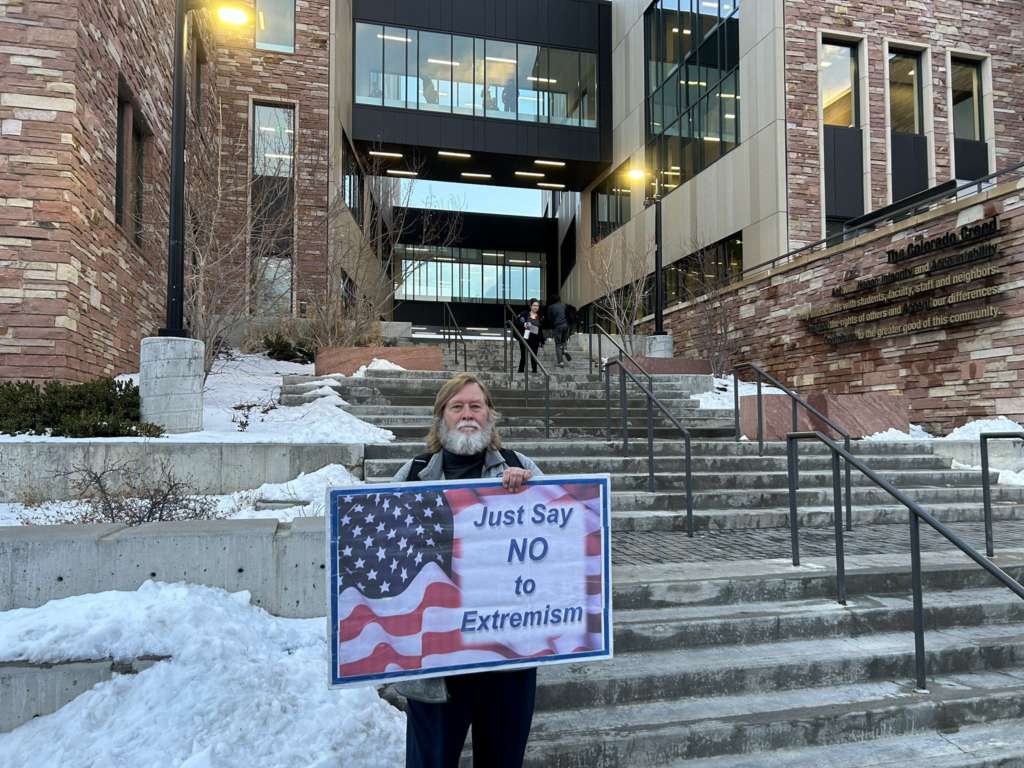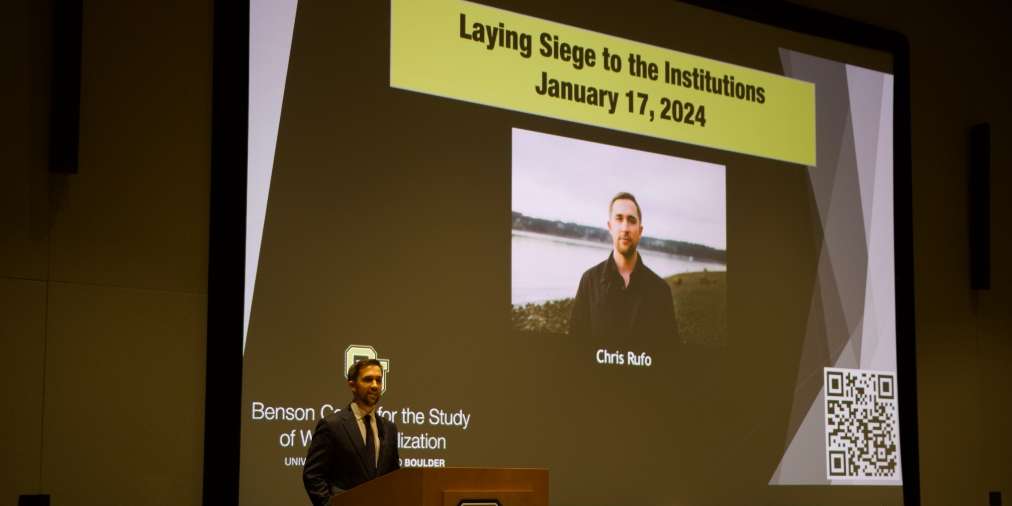Conservative activist Chris Rufo argued that diversity, equity and inclusion (DEI) policies “undermine the principles of liberal education” during his “Laying Siege to Institutions” event at the University of Colorado Boulder on Wednesday.
“What [DEI] is, is a racial categorization, racial scapegoating, and the application of racial guilt to one group and one group only,” Rufo told the crowd of approximately 200 people.
Rufo is a senior fellow at the Manhattan Institute, the conservative think tank founded by Reagan-era CIA director William Casey, and has been able to successfully launch national campaigns, picked up by local activists, against culture war issues like critical race theory and LGBTQ inclusion in K-12 education.
“We have successfully frozen their brand — ‘critical race theory’ — into the public conversation and are steadily driving up negative perceptions,” tweeted Rufo in March 2021. “We will eventually turn it toxic, as we put all of the various cultural insanities under that brand category. The goal is to have the public read something crazy in the newspaper and immediately think ‘critical race theory.’”
During a Nov. 15, 2022 Douglas County Board of Education meeting, Colorado Parent Advocacy Network (CPAN) activist Amy Windju warned that GSA [Gay Straight Alliance or Gender Sexuality Alliance] clubs in schools were being used as a front for “racial” activism. Windju’s comments were lifted almost verbatim from a 2022 op-ed by Rufo.
Rufo also briefly served on board of advisors for the Foundation Against Intolerance and Racism (FAIR), a conservative activist group that has been active in school board fights in Douglas and El Paso Counties.

“What I call the cabal in Douglas County, the conservative cabal, they’re people who have been in power ever since Charles Koch invested in the Freedom School in 1963 out in Larkspur,” said the event’s sole protester, Lloyd Guthrie, an organizer with Douglas County activist group Just Say No to Extremism. “Now there’s a sort of a national collusion of ideas that are based on fear and lies and other nefarious things. What we saw and we’ve seen in the last couple of school board elections is that those themes work their way into the local election. The problem with that is that somewhere else, someone’s creating the communications and messaging and the conservative cabal in Douglas County, whether it’s the schools, or the federal government, or the state, or the county government, they’re a part of that network.“
During his presentation, Rufo argued that college DEI programs “systemically discriminate against white and Asian applicants.” Rufo pointed to recent trainings at CU-Boulder as an example.
“One of the resources promoted by this program was ‘How to be a better white person,’” he said. “Would you talk that way about any group? And if you wouldn’t, why is it permissible to say you know what? It’s time for you to learn how to be a better white person. Take aside it’s condescension. Take aside the patronizing tone. Take aside the kind of subtle bigotry that is connoted in those words and just say, well, what does it mean to be a white person? Are all white people the same? Are all people of other groups the same?”
CU Regent Wanda James was not impressed with Rufo’s 45-minute discussion and ensuing question and answer segment. “His presentation was filled with half truths and lies,” she said. “Because of that, we end up arguing the minutia of half-truths, and it becomes absurd. I was expecting a more educated man on the subject of diversity. Quite frankly, it was light and glossed over and it really presented no real hard facts. One of the questions that I did ask was — and they didn’t ask it [during the Q and A segment] — is give me a KPI [key performance indicator] where white people are not winning and white men are not super winning. So what is the point of wanting to remove programs that would help diversity? And we didn’t hear any of that tonight. What’s the case against diversity? Because we currently do not have it. Clearly the numbers are quite clear.”
According to CU Boulder’s Fall 2023 enrollment profile, 65.2% of the student body is white.

“All you have to do is go look at our numbers and you’ll see that none of that is true,” said James. “The other thing that he did not address as well, too, is — I’m tired of the idea that some Black, or Latino, or even Asian student, took the seat of a very qualified white student, or whatever story you want to make up there, but yet no one has talked about — and we do not do it here at CU — but legacy appointments at Harvard, Yale and our top universities. The legacy appointments are people whose parents went to the school, or parents that have given the new library wing to whatever. Their students tend to get in at so much higher rates than we have ever seen for any affirmative action or DEI entrance into college. So if you really want to look at who’s taking spaces from well-qualified college students, it’s some dumb-ass rich kid.”
Rufo’s presentation was organized by CU’s Benson Center, a bastion of conservative thought at the school that’s become notorious for some of the controversial scholars it’s employed. Most recently, conservative lawyer John Eastman, who played a crucial role not only in aiding former President Donald Trump’s efforts to overturn his loss in the 2020 election and spreading disinformation but also in stoking the insurrection at the Capitol in Washington, D.C.
In 2022, progressive activist group New Era Colorado launched a campaign to close the Benson Center. “It’s an institution that serves as a symbol of white supremacy,” said Hayley Banyai-Becker, the former organizing program manager for New Era Colorado. “It centers the ideologies and teachings of western civilization in its curriculum and practices, so from that it really creates a harmful environment for students who hold marginalized identities. … The Benson Center has long been associated with harmful and divisive speech and actions. The first appointed visiting scholar at the Center was Steven Hayward and he openly mocked the LGBTQ community in 2014.”
James doesn’t believe the Benson Center should be closed. “I am not part of the Benson Center and their funding and everything else,” said James. “Personally, I am not a conservative. I agree with very little that the Benson Center has to say. However, I do believe that it’s important for the students to have a Benson Center, because hopefully when the Benson Center does stuff like this, or when we hear about a John Eastman, it entices students to go look for the truth and see what is actually happening. The fact that it’s happening, so controversial, right here on campus, I’m hoping that it motivates more thought and better thought.”




